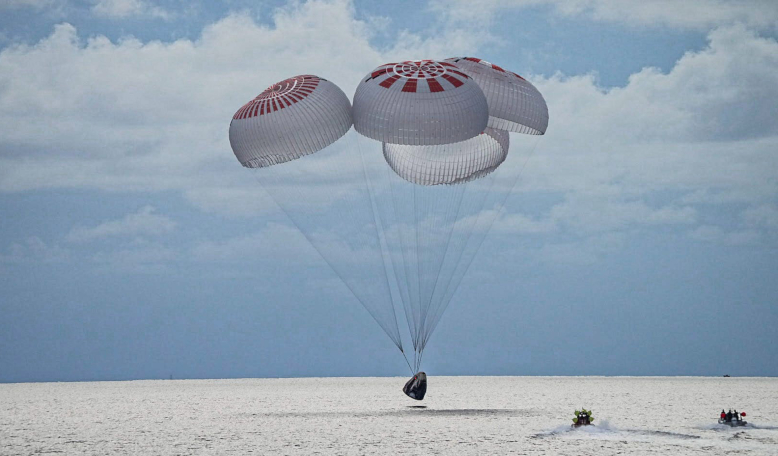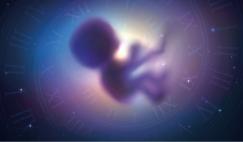Four amateur astronomers on SpaceX's Inspiration4 mission plummeted through Earth's atmosphere in a fiery re-entry Saturday evening and splashed down in the Atlantic Ocean off Florida.
Slowed by parachutes, the Crew Dragon capsule Resilience landed near Kennedy Space Center, where ships retrieved the crew for a brief helicopter flight to the former space shuttle landing facility.
The heat shield of the capsule underwent extreme heat up to 3,500 degrees F during reentry.
"Dragon itself is an extremely intelligent vehicle that is largely autonomous ... so the crew really just has to sit back and enjoy the flight," Andy Tran, SpaceX's avionics production supervisor, said during a live broadcast.
Recovery crews hoisted the capsule onto a recovery ship about 30 minutes after splashdown.
"Congratulations @Inspiration4x !!!" SpaceX founder Elon Musk tweeted after the landing.
Their return after almost three days marked the successful conclusion of the first privately funded orbital spaceflight, led by billionaire philanthropist Jared Isaacman.
He chose Memphis-based St. Jude Children's Research Hospital as the benefactor for a fundraising effort tied to the mission, donating $100 million himself in honour of Inspiration4. SpaceX announcers said Saturday that the mission has raised an additional $60 million, but more is expected.
SpaceX announcers said the crew watched movies as they waited for recovery at sea, after days of medical research in microgravity and multiple calls to Earth, including conversations with patients at St. Jude and actor Tom Cruise.
"The water where we landed ... it's very calm," SpaceX engineer Jessie Anderson said during the livestream. "It's really a lot easier for the crew to perform the recovery operation ... we've had just great weather, all around."
As part of his vision to inspire others, Isaacman chose civilians for the crew: childhood cancer survivor and physician assistant Haley Arceneaux, 29, who is the mission medical officer; educator, artist and pilot Sian Proctor, 51; and engineer Chris Sembroski, 42.
The livestream Saturday showed Isaacman and Proctor waving from their seats as the recovery crew entered the capsule.
Arceneaux emerged first, flashing a thumbs-up sign to the SpaceX crew, followed by Proctor, Sembroski and Isaacman. All appeared to be well.
On the ship after landing, mission director Scott Poteet said that the crew enjoyed the experience and had no significant problems.
"They're taking selfies; they're having a good time. They're eating, they're standing up walking around. It's just an amazing ride for everyone," Poteet said at a press conference.
The hatch that provided access to a large, domed window with views of Earth was open for many hours during the mission, Poteet said. He said the hatch was closed only when crew slept or used the lavatory on board.
"What is such an amazing thing about this mission is that it's not focused on the crew, [but] on the men and women of St. Jude and what they are doing day in and day out -- literally changing the course of children's lives," he said.
There was only one minor issue during the flight, with the capsule's toilet system, but a solution was quickly found, mission director Todd Ericson said at a press conference after the landing, without giving further details.
Both Poteet and Ericson noted how the mission opened up a "whole new chapter in human spaceflight" because the public was able to see civilians in space. "Welcome to the second space age," Ericson said. With the trips completion, "space travel becomes much more accessible to average men and women."











